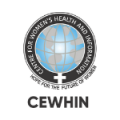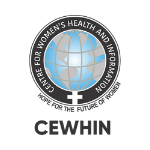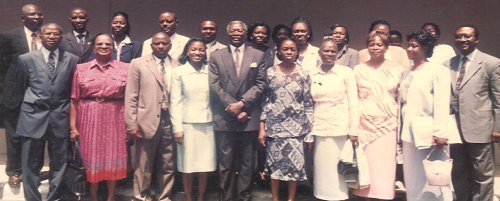This project was executed in collaboration with the Lagos State Chapter of the Medical Women’s Association and the Lagos Team of Prevention of Maternal Mortality Network and funded by the Averting Maternal Deaths and Disability Program of the Mailman School of Public Health, Columbia University, New York in the year 2003. It was aimed at promoting women’s access to emergency obstetric care services towards reducing the high maternal mortality ratio that Nigeria records annually. Furthermore, it was designed to promote government accountability to women in the delivery of EmOC services to women in Lagos state.
In executing the project the following activities were carried out:
• Field Research at Ibeju Lekki Local Government Area
In a bid to have a fair appreciation of the readiness of the community people and the health care service delivery system for effective management of maternal health demands in the local government areas where we worked, the project working group carried out a needs assessment of the available government and private health facilities that offer obstetric care services within the local government.
Our findings revealed among other things the lack of appropriate facilities and drugs, lack of a systematic/efficient response system to obstetric emergencies. The assessment exercise revealed that none of the government owned Primary Health Care Centres at Ibeju Lekki Local Government Area was equipped to offer basic emergency obstetric care services.
The health system of the two local government areas also lack an integrated HIV/AIDS management system in view of the fact that pregnant women in the area (Ibeju and Lekki local government areas) prefer to use the services of Traditional Birth Attendants (TBAs) who are not skilled enough to prevent the transmission of the virus either from mother to child or from one person to the other.
One of the crucial reasons why women do not go to the health centres to seek care from skilled health workers is due to lack of funds to pay for such services. This is why at the moment the Centre is working closely with the Lagos State government towards the development of an Emergency Obstetric Care Trust Fund for the State through private sector support.
• Advocacy Visits
The Centre undertook a series of advocacy visits to the Chairman of the Lagos State Hospitals Management Board, The Local Government Civil Service Commission, and The Local Government Secretariat Chairmen both at Ibeju and Lekki. The team also visited the Epe General Hospital being the major referral Centre that services the Ibeju Lekki Local government area amongst others. All these visits were geared towards enlisting the support of all stakeholders involved in providing health care services for women for improved access to emergency obstetric care services as well.

The working group on the project and other members of CEWHIN went on an advocacy visit to the Commissioner for Health, Lagos State Ministry of Health on Tuesday 19th August 2003. The purpose of the visit was to intimate the commissioner on the project highlighting the project objectives and future activities. The group also sought the support of the commissioner and the Ministry for the success of the future follow-up activities.
• Consultative Forum on Improving Women’s Access to Emergency Obstetric Care Services in Lagos state
As part of the project on “ Improving Women’s Access to Emergency Obstetric Care Services in Lagos State ”, a consultative forum with officials of the Lagos State Ministry of Health, private and public sector health care providers and women’s health advocates was held on Monday September 29, 2003 at the Sheraton Hotel and Towers with the aim of presenting the findings of work that was done at the Ibeju Lekki local government area to policy makers and service providers as well as to advocate the evolvement of simple and practicable low cost strategies that can promote women’s access to emergency obstetric care services in Lagos state.

The forum recommended effective community awareness and mobilization for increased knowledge on recognition of danger signs; exploration of public/private partnership in promoting women’s access to EmOC services; the creation of an emergency obstetric care trust fund for Lagos State; creation of training opportunities for health staff at the Ibeju/Lekki local government; free antenatal care and emergency obstetric care services at all levels of health care service delivery in Lagos State; establishment of monitoring mechanisms within communities with full community participation and ownership for ensuring access to quality EmOC services.
• Information Dissemination Seminar
Consequent upon the completion of the needs assessment carried out in implementing the project titled “Improving Women’s Access to Quality Emergency Obstetric Care Services in Nigeria”, an information dissemination seminar was held on Thursday, November 27, 2003 at the Akodo Secretariat of Ibeju Lekki local government area. The outcome of the assessment was shared with the 50 participants that were at the seminar.
The participants were Ibeju/Lekki health workers, members of the Catchment Area Planning Committee (CAPA), women of child bearing age and representatives of all the wards that constitute the local government where the project was executed. Although at the inception of the project Ibeju Lekki was one local government area, but towards the end of the project period, the Lagos state government created additional local government areas. Hence, the local government became Ibeju and Lekki local government areas.
The forum served as an opportunity for the community to participate in the process of developing appropriate interventions for addressing some of the problems that were identified. At this forum a committee was set up to ensure that the provision of obstetric care services in the area was improved and that the rehabilitation of the two public health facilities selected by the communities be carried out successfully and in good time.

* Community Awareness Campaign among community people on recognition of danger signs of obstetric complications and to encourage the use of services being provided by rehabilitated Primary Health Centres
In view of the outcome of the needs assessment carried out at the beginning of the project which revealed low level of knowledge among community people and Traditional Birth Attendants (TBAs) of danger signs of obstetric complications, in pregnancy and childbirth, we organised a Community Awareness Campaign during the year 2004.
A training of trainers’ workshop was held for eight (8) Nurses/Midwives who work in the local government area. They conducted the training of community people and Traditional Birth Attendants (TBAs) on the recognition of danger signs in pregnancy and childbirth. In all, eight (8) training sessions were held with community people selected from fifty seven (57) communities under Ibeju and Lekki local government areas.
A total of two hundred and two (202) participants attended the training sessions. One of the training sessions was organised for Traditional Birth Attendants and this had in attendance twenty one (21) participants selected from fifteen (15) communities.
A Consultative Session was also held with the executives of the Catchment Area Planning and Action Committee (CAPA) on how to monitor the health system for effective delivery of EmOC services. Issues relating to early referral by TBAs, record keeping, government accountability and the right of access to functional health care services were discussed at this forum.



